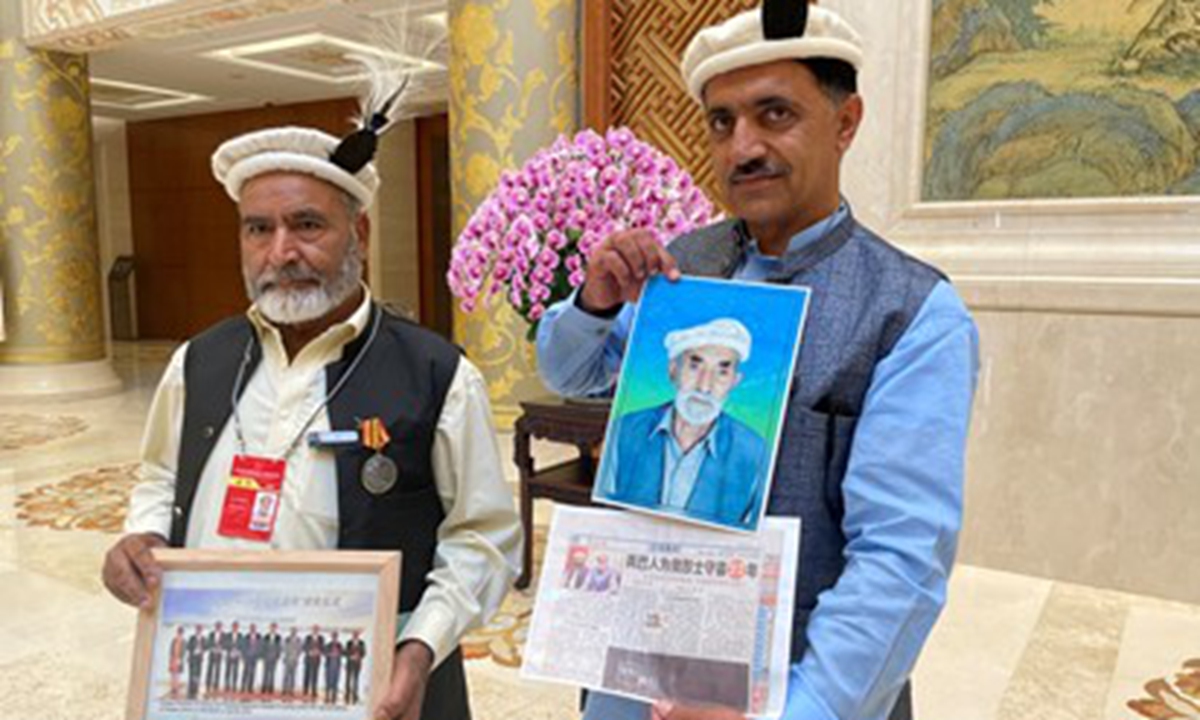
Ahmed Ali (left) and Manzoor Hussain, caretakers of the Gilgit Chinese Memorial Cemetery in Pakistan, attend the commemorative events for the Five Principles of Peaceful Coexistence in Beijing on June 28, 2024. Photo: Liu Xin/GT
China on Friday held a series of activities, including a commemorative conference, in Beijing to mark the 70th anniversary of the Five Principles of Peaceful Coexistence. Ali Ahmed, who has been the caretaker of the Gilgit Chinese Memorial Cemetery in Pakistan for 46 years and received the Five Principles of Peaceful Coexistence Friendship Award in 2015, was invited to attend the events on Friday and said in an interview with the Global Times that peace is precious in any era.
The Chinese Memorial Cemetery in Gilgit, northern Pakistan, is the burial ground of Chinese engineering personnel who sacrificed their lives to build the Karakoram Highway. The Karakoram Highway, also known as the China-Pakistan friendship highway, was jointly constructed by Chinese and Pakistani road workers according to agreements between the two governments.
The highway, which passes through the Pamir Plateau, is 1,200 kilometers long and took 12 years to complete, starting in 1966. Due to the complex geological conditions along the highway, avalanches, landslides, and mudslides frequently occurred, leading to the deaths of over 100 Chinese engineering personnel. Apart from a few whose remains were repatriated for burial in China, the other 88 Chinese builders rest in Pakistani soil.
In 1977, on the eve of the completion of the highway, Ahmed and Madad Ali, who participated in burying the bodies of the Chinese martyrs, voluntarily applied to the government to care for the cemetery. Their application was soon approved.
In June 1978, Pakistan officially established the Chinese Memorial Cemetery in Gilgit on the site and built a white monument in the center of the cemetery inscribed with "Graveyard of Comrades who gloriously sacrificed their lives in assisting Pakistan in building roads with Chinese aid."
Ahmed and Madad have been silently guarding the 88 heroes here since then. After Madad passed away, his son Manzoor Hussain took over the mission and continued to guard the cemetery.
Hussain, along with Ahmed, came to Beijing for the Friday anniversary events. During the interview with the Global Times, they showed the certificate of the Friendship Award for the Five Principles of Peaceful Coexistence, photos of them receiving the award, and a copy of the Global Times from August 6, 2004, which they have always cherished.
In the newspaper, the story of the Pakistani caretakers and their Chinese connection was detailed. At the time, Ahmed told the Global Times that the biggest difficulty in caring for the cemetery was water.
The water used locally was brought down from the mountains and supplied in scheduled time slots. Sometimes, they had to water the flowers and trees at the cemetery at night. The electricity supply to the cemetery was also unreliable, forcing them to work in the dark. Spending the night in the small house at the cemetery was common.
In 2004, Ahmed said that he would continue to guard the cemetery "until he can no longer work." On that day, he hoped his son would take over the job. He and Manzoor Hussain said that the people of Pakistan know that it was the Chinese who helped them build this road with their lives, and their families will continue to guard the cemetery and pass on this responsibility in the future.




